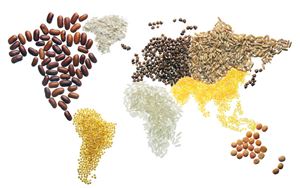With food and nutrition a major theme of next year?s Universal Exposition in Milan, The Florentine is running a series of articles related to a variety of issues surrounding food, including sustainability and biodiversity, food security, transparency and safety, science and technology in the food supply chain and consumption and dietary issues. In this article, we look at the European Union?s regulatory framework for food labeling, the Food Information to Consumers (FIC) Regulation, and how it affects Italy and Italian food producers.
How important are food labels to you as a consumer? Do you read them and make more informed decisions based on the provenance and type of the ingredients? Does a food or an ingredient?s country of origin affect your food choice or are prices the most important factor in your food purchases? Are you more likely to buy foods that are made in Italy compared to foods made in other countries?
Years of discussion in Brussels resulted in December 2011 in a new regulatory framework introducing more transparent, clearer food labeling across Europe?s common market, the FIC Regulation, which aims to better protect consumers against false or misleading packaging claims. Now, after a three-year grace period to allow the food industry to prepare for the new labeling requirements, compliance with the FIC Regulation starts December 14, 2014. The regulation mandates more detailed nutrition declarations on processed foods (which has a later start date of December 16, 2016); information on allergens; and identification of the country of origin or place of provenance of certain foods.
Trust in highly industrialized processed and pre-packaged foods has decreased significantly in recent years, prompted by a series of food-related scandals that have lowered consumer confidence. Surveys conducted in the European Union and Italy indicate that consumers want to know where their foods come from, making country of origin labeling (COOL) a major issue and an important element of the regulation.
Mandatory COOL rules across the European Union are already in place for a number of foods, including extra-virgin olive oil, honey, fresh milk, fresh fruit and vegetables, beef, fish and eggs, and the FIC Regulation has extended COOL rules to all fresh, chilled and frozen unprocessed meats, such as pork (to be applied April 1, 2015), sheep, goat and poultry. However, there still remains the question of applying mandatory COOL rules to other foodstuffs, such as dairy products, among them cheese and ultra-high-temperature-processed milk; pasta; bread; fruit juices; some types of cured meats, like prosciutto and salami; as well as less popular fresh meats, like quail and pigeon, rabbit and horse. To address this question, the FIC has entrusted the European Commission to assess whether extending COOL requirements to these foods would be appropriate. Impact assessments will be conducted in Brussels and Strasbourg through 2015 to evaluate whether an extension of COOL to these products will benefit consumers while enabling the free movement of goods across the European Union and ensuring equal competition among national producers.

COOL increases traceability along the food supply chain and is considered one way to weed out misleading advertising and increase transparency regarding the provenance of foods and their ingredients. Knowing where a food was produced is also an important indication of quality to consumers and a measure that would support national producers, argues Italy?s national farmers? association, Coldiretti. ?We believe that mandatory COOL rules should be applied to all foods sold in Italy and across Europe, not just the very few listed in the regulation,? Rolando Manfredini, quality manager at Coldiretti, told The Florentine. ?The E.U. fears that an extension of mandatory COOL rules will result in price increases for consumers but that?s not true,? he added.
Italy?s minister of agriculture and forestry, Maurizio Martina, also seems to support an extension of mandatory COOL rules, saying in a recent statement that ?food labels and country of origin information are important tools for Italy?s food and agricultural sectors and crucial to all foods that are ?Made in Italy.??
To better gauge public opinion on the issues surrounding food traceability and origin labeling, Italy?s ministry of agriculture and forestry has opened an online public consultation. Until January 7, 2015, Italian consumers are invited to answer 11 multiple-choice questions (see theflr.net/9e7tch), and the results of the survey will be used to inform Italian policy makers as they determine whether to introduce national measures mandating COOL. Indeed, the FIC Regulation allows member states to adopt national measures on COOL where ?there is a proven link between certain qualities of the food and its origin or provenance.?
However, some question the utility of mandatory COOL rules for Made in Italy foods. Expert in EU food law Dario Dongo told The Florentine that a broader, mandatory use of COOL would inevitably result in additional costs for many food producers, especially those who produce foods containing many ingredients: ?Making COOL rules obligatory across the board does not only mean costs associated with changing a product?s label but may also require, depending on the subsector, a series of costly bureaucratic procedures. Think of a producer who has to provide COOL for all of the ingredients in a given product, which could be more than a dozen.? Ensuring the traceability of all ingredients, Dongo noted, means that producers would have to, among other things, change how they source, store, document and process raw materials, and they would have to conduct continuous review of existing labels.
Dongo believes that making COOL mandatory for some categories of foods, like single-ingredient foods and staples such as milk and cheese, is a good compromise. He also supports the return on labels of the production plant in which foods were made because “knowing where the ingredients were farmed is just as important as knowing where they were processed and where a food was ultimately produced,’ he said. In Italy this information was required on labels by a 1992 law, which was abrogated when the FIC regulation entered in force. Many want to bring this requirement back to Italian food labels, including the Ministry of Agriculture and Forestry and the Ministry of Economic Development.
Conversely to Coldiretti, Federalimentare?s [Federation of the Italian Food Industry] believes that COOL should be a voluntary measure not a mandatory one. Indeed, the FIC Regulation allows individual food producers to provide country-of-origin labels on a voluntary basis, and many producers already do so in Italy, believing that providing COOL denotes a higher-quality product and thus gives their product a competitive edge.
CORRECTIONS: Dario Dongo’s stance on the debate over whether to make COOL mandatory has been corrected; different from what was previously noted in this article, he believes that mandatory COOL could be useful for certain food categories and that Italy should reinstate on all labels the requirement to indicate the production plant in which foods were made.







